- Home
- Arthur Miller
Collected Essays Page 16
Collected Essays Read online
Page 16
In other words, these plays are not mere exercises in psychology. They are woven around a very critical point of view, a point of view not only toward the characters, but toward the social context in which they live, a point of view which—far from being some arbitrary angle, as we have come to call such things—is their informing principle. I haven’t the time here to investigate the plays one by one and it is not the business of the moment. All I have said comes down to this: that with all our technical dexterity, with all our lighting effects, sets, and a theater more solvent than any I know about, yes, with all our freedom to say what we will—our theater is narrowing its vision year by year, it is repeating well what it has done well before.
I can hear already my critics complaining that I am asking for a return to what they call problem plays. That criticism is important only because it tells something important about the critic. It means that he can only conceive of man as a private entity, and his social relations as something thrown at him, something “affecting” him only when he is conscious of society. I hope I have made one thing clear to this point—and it is that society is inside of man and man is inside society, and you cannot even create a truthfully drawn psychological entity on the stage until you understand his social relations and their power to make him what he is and to prevent him from being what he is not. The fish is in the water and the water is in the fish.
• • •
I believe we have arrived in America at the end of a period because we are repeating ourselves season after season, despite the fact that nobody seems to be aware of it. In almost every success there is a striking similarity of mood and of mode. There is one play after another in which a young person, usually male, usually sensitive, is driven either to self-destructive revolt or impotency by the insensitivity of his parents, usually the father. A quick and by no means exhaustive look brings to mind, Look Homeward Angel, Dark at the Top of the Stairs, Cat on a Hot Tin Roof, A Hatful of Rain. I wish to emphasize at once that I am not here as a critic of these plays as plays, nor do I intend to equate their worth one with the other. I am rather looking at them as a stranger, a man from Mars, who would surely have to wonder at so pervasive a phenomenon.
Now I am not saying there is anything “wrong” with this theme, if only because I have written more than once on it myself. It lies at the heart of all human development, and its echoes go to Hamlet, to Romeo and Juliet, to Oedipus Rex. What I am critical of is that our theater is dealing almost exclusively with affects. Where the parent stands the world ends, and where the son stands is where the world should begin but cannot because he is either made impotent, or he revolts, or more often runs away. What is there wrong with this? Does it not happen all the time? It must, or so many playwrights would not be repeating the theme, and it would not have the fascination it evidently does for so many audiences.
What is wrong is not the theme but its failure to extend itself so as to open up ultimate causes. The fact, for one thing, is not merely the frustration of the children, or even the bankruptcy of moral authority in the parents, but also their common awareness in our time of some hidden, ulterior causation for this. If only because this theme is so recurrent, the phenomenon has the right to be called a generalized social one. Therefore, it is proper in this instance to say that the potential vision of these plays is not fulfilled and their potential aesthetic size and perfection is left unrealized. And perhaps even more important, there is implicit in this cut-down vision a decay of nerve, a withering of power to grasp the whole world on the stage and shake it to its foundations as it is the historic job of high drama to do. The mystery of our condition remains, but we know much more about it than appears on our stage.
I am not asking for anything new, but something as old as the Greek drama. When Chekhov, that almost legendary subjectivist, has Vershinin—and many others in his plays—objectifying the social questions which his play has raised, he is merely placing himself within the great tradition which set its art works fully in view of the question of the survival of the race. It is we who are the innovators, or more precisely, the sports, when we refuse to reflect on our stage a level of objective awareness at least as great as exists commonly in our lives outside.
I am asking for the world to be brought into the stage family, to be sure, but I begin and I end from the viewpoint of the dramatist, the dramatist seeking to intensify the power of his plays and his theater. There is something dramatically wrong, for instance, when an audience can see a play about the Nazi treatment of a group of Jews hiding in an attic, and come away feeling the kind of—I can only call it gratification—which the audiences felt after seeing The Diary of Anne Frank. Seeing this play I was not only an audience or even a Jew, but a dramatist, and it puzzled me why it was all so basically reassuring to watch what must have been the most harrowing kind of suffering in real life.
As a constructor of plays I had nothing technical of consequence to add. And I found myself putting to this play the question I have put to you—what is its relevancy to the survival of the race? Not the American race, or the Jewish race, or the German race, but the human race. And I believe the beginning of an answer has emerged. It is that with all its truth the play lacks the kind of spread vision, the over-vision beyond its characters and their problems, which could have illuminated not merely the cruelty of Nazism but something even more terrible. We see no Nazis in this play. Again, as with the plays I have mentioned, it is seen from the viewpoint of the adolescent, a poignant and human viewpoint to be sure, but surely a limited one. The approach of the Nazi is akin to the approach of a childhood Demon.
What was necessary in this play to break the hold of reassurance upon the audience, and to make it match the truth of life, was that we should see the bestiality in our own hearts, so that we should know how we are brothers not only to these victims but to the Nazis, so that the ultimate terror of our lives should be faced—namely our own sadism, our own ability to obey orders from above, our own fear of standing firm on humane principle against the obscene power of the mass organization. Another dimension was waiting to be opened up behind this play, a dimension covered with our own sores, a dimension revealing us to ourselves.
Once this dimension had been unveiled we could not have watched in the subtly perverse comfort of pathos; our terror would no longer be for these others but for ourselves, once that part of ourselves which covertly conspires with destruction was made known. Then, for one thing, even tragedy would have been possible, for the issue would not have been why the Nazis were so cruel, but why human beings—ourselves, us—are so cruel. The pathetic is the refusal or inability to discover and face ultimate relevancy for the race; it is therefore a shield against ultimate dramatic effect.
In this instance the objection will be raised that I am demanding a different kind of play than Diary was intended to be. I am. I make this demand, if one can presume so far, even though I believe that the original book was very faithfully followed by the dramatists who adapted it. Who am I to argue with the martyred girl who wrote the original document? Her right to her point of view is irreproachable. I agree that it is irreproachable. I repeat, as a matter of fact, what I said earlier—that the adolescent viewpoint is and should be precious to us. In this instance, first of all, I am treating the play as a separate work, as another play opening in New York. Secondly, I am using it to show that even when the adolescent viewpoint is most perfectly announced and movingly dramatized, it nevertheless has a nature, an inner dynamic which prevents it from seeing what it cannot see and still be itself.
It is necessary, in short, to be able to appreciate a thing for what it is, and to see what it is not and what it might be. Our present failure to distinguish between low and high altitude, between amplitude and relative narrowness, leaves us—as it leaves the critics for the most part—at the mercy of “affects”; which is to say that if a small play of minor proportions achieves its affects well, it is as good as a large play of gr
eater proportions.
One consequence of this inability to distinguish between the sizes of things, so to speak, is to condemn ourselves ultimately to minor art. For it is always more likely that small things of shallow breath will show fewer defects than the large, and if the perfecting of affects, regardless of their larger relevancies or irrelevancies, is to be our criterion, as it threatens now to be, we shall turn the theater into a kind of brooding conceit, a showplace for our tricks, a proving ground for our expertise, a shallows protected from the oceans.
I repeat that I am not here as a critic of individual plays but of the dramatic viewpoint which I believe imposes by no means unbreakable limitations upon them. They are limitations which tend to force repetitions of mood, mode, style, yes, and even the lighting and setting of one play after another, even as they are written by writers in their individual isolation. While on the one hand we prize the original work, the new creation, we are surprisingly unconscious of the sameness of so much that passes for new. But the new, the truly new dramatic poem will be, as it has always been, a new organization of the meaning, the generalized significance of the action.
A moment ago I threw together several plays for the purposes of this discussion, one of which I should like now to set apart. In every way but one Cat on a Hot Tin Roof differs from Diary of Anne Frank, as well as from the others mentioned. Williams has a long reach and a genuinely dramatic imagination. To me, however, his greatest value, his aesthetic valor, so to speak, lies in his very evident determination to unveil and engage the widest range of causation conceivable to him. He is constantly pressing his own limit. He creates shows, as all of us must, but he possesses the restless inconsolability with his solutions which is inevitable in a genuine writer. In my opinion, he is properly discontented with the total image some of his plays have created. And it is better that way, for when the image is complete and self-contained it is usually arbitrary and false.
It is no profound thing to say that a genuine work of art creates not completion, but a sustained image of things in tentative balance. What I say now is not to describe that balance as a false or illusory one, but one whose weighing containers, so to speak, are larger and greater than what has been put into them. I think, in fact, that in Cat on a Hot Tin Roof, Williams in one vital respect made an assault upon his own viewpoint in an attempt to break it up and reform it on a wider circumference.
Essentially it is a play seen from the viewpoint of Brick, the son. He is a lonely young man sensitized to injustice. Around him is a world whose human figures partake in various ways of grossness, Philistinism, greed, money-lust, power-lust. And—with his mean-spirited brother as an example—it is a world senselessly reproducing itself through ugly children conceived without the grace of genuine affection, and delivered not so much as children but as inheritors of great wealth and power, the new perpetuators of inequity.
In contrast, Brick conceives of his friendship with his dead friend as an idealistic, even gallant and valorous and somehow morally elevated one, a relationship in which nothing was demanded, but what was given was given unasked, beyond the realm of price, of value, even of materiality. He clings to this image as to a banner of purity to flaunt against the world, and more precisely, against the decree of nature to reproduce himself, to become in turn the father, the master of the earth, the administrator of the tainted and impure world. It is a world in whose relations—especially between the sexes—there is always the element of the transaction, of materiality.
If the play confined itself to the psychiatry of impotence, it could be admired or dismissed as such. Williams’ plays are never really that, but here in addition, unlike his other plays, there is a father. Not only is he the head of a family, but the very image of power, of materiality, of authority. And the problem this father is given is how he can infuse his own personality into the prostrated spirit of his son so that a hand as strong as his own will guide his fortune when he is gone—more particularly, so that his own immortality, his civilization will be carried on.
As the play was produced, without the surface realism of living-room, bedroom, walls, conventional light—in an atmosphere, instead, of poetic conflict, in a world that is eternal and not merely this world—it provided more evidence that Williams’ preoccupation extends beyond the surface realities of the relationships, and beyond the psychiatric connotations of homosexuality and impotence. In every conceivable fashion there was established a goal beyond sheer behavior. We were made to see, I believe, an ulterior pantheon of forces and a play of symbols as well as of characters.
It is well known that there was difficulty in ending this play, and I am certainly of no mind to try it. I believe I am not alone in saying that the resolutions wherein Brick finally regains potency was not understandable on the stage. But my feeling is that even if this were more comprehensively motivated so that the psychiatric development of the hero were persuasively completed, it in itself could not embrace the other questions raised in the play.
We are persuaded as we watch this play that the world around Brick is in fact an unworthy collection of unworthy motives and greedy actions. Brick refuses to participate in this world, but he cannot destroy it either or reform it and he turns against himself. The question here, it seems to me, the ultimate question is the right of society to renew itself when it is, in fact, unworthy. There is, after all, a highly articulated struggle for material power going on here. There is literally and symbolically a world to win or a world to forsake and damn. A viewpoint is necessary, if one is to raise such a tremendous issue, a viewpoint capable of encompassing it. This is not a study in cynicism where the writer merely exposes the paradoxes of all sides and is content to end with a joke. Nor, again, is it mere psychiatry, aiming to show us how a young man reclaims his sexuality. There is a moral judgment hanging over this play which never quite comes down. A tempting analogy would be that of a Hamlet who takes up his sword and neither fights nor refuses to fight but marries an Ophelia who does not die.
Brick, despite his resignation from the race, has thrown a challenge to it which informs the whole play, a challenge which the father and the play both recognize and ignore. But if it is the central challenge of the play—as the play seems to me to emphasize—then the world must either prove its worthiness to survive, or its unworthiness must lie dramatically proved, to justify Brick’s refusal to renew it—or, like a Hamlet who will neither do battle nor put down his sword, it must condemn Brick to inaction and perhaps indifference to its fate.
Because of Williams’ marvelous ability, I for one would be willing to listen—and perhaps to him alone—even as he pronounced ultimate doom upon the race—a race exemplified in his play by the meanest of motives. This is a foundation grand enough, deep enough, and worthy of being examined remorselessly and perhaps even shaken and smashed. Again, as with The Diary of Anne Frank, had the implicit challenge ripened, we should no longer be held by our curiosity or our pity for someone else, but by that terror which comes when we must in truth justify our most basic assumptions. The father in this play, I think, must be forced to the wall in justification of his world, and Brick must be forced to his wall in justification of his condemning that world to the ultimate biological degree. The question of society’s right to insist upon its renewal when it is unworthy is a question of tragic grandeur, and those who have asked this question of the world know full well the lash of its retaliation.
Quite simply, what I am asking is that the play pursue the ultimate development of the very questions it asks. But for such a pursuit, the viewpoint of the adolescent is not enough. The father, with the best will in the world, is faced with the problem of a son he loves best refusing to accept him and his spirit. Worse yet, it is to the least worthy son that that spirit must be handed if all else fails. Above the father’s and the son’s individual viewpoints the third must emerge, the viewpoint, in fact, of the audience, the society, and the race. It is a viewpoint that must weigh,
as I have said, the question of its own right to biological survival—and one thing more, the question of the fate of the sensitive and the just in an impure world of power. After all, ultimately someone must take charge; this is the tragic dilemma, but it is beyond the viewpoint of adolescence. Someone must administer inequity or himself destroy that world by refusing to renew it, or by doing battle against its injustice, or by declaring his indifference or his cynicism. The terms upon which Brick’s potency returns are left waiting to be defined and the play is thus torn from its climax.
Again, I am not criticizing this play, but attempting to mark the outlines of its viewpoint—which is an extension of our theater’s viewpoint to its present limits. Nor is this an entirely new and unheralded idea. Be it Tolstoy, Dostoevsky, Hemingway, you, or I, we are formed in this world when we are sons and daughters and the first truths we know throw us into conflict with our fathers and mothers. The struggle for mastery—for the freedom of manhood or womanhood as opposed to the servility of childhood—is the struggle not only to overthrow authority but to reconstitute it anew. The viewpoint of the adolescent is precious because it is revolutionary and insists upon justice. But in truth the parent, powerful as he appears, is not the source of injustice but its deputy.
A drama which refuses or is unable to reach beyond this façade is denying itself its inherited chance for greatness. The best of our theater is standing tiptoe, striving to see over the shoulders of father and mother. The worst is exploiting and wallowing in the self-pity of adolescence and obsessive keyhole sexuality. The way out, as the poet has said, is always through. We will not find it by huddling closer to the center of the charmed circle, by developing more and more naturalism in our dialogue and our acting, that “slice-of-life” reportage which is to life what an overheard rumor is to truth; nor by setting up an artificial poetic style, nor by once again shocking the householders with yet other unveilings of domestic relations and their hypocrisies. Nor will we break out by writing problem plays. There is an organic aesthetic, a tracking of impulse and causation from the individual to the world and back again which must be reconstituted. We are exhausting the realm of affects, which is the world of adolescence taken pure.

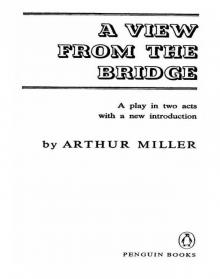 A View From the Bridge: A Play in Two Acts
A View From the Bridge: A Play in Two Acts Broken Glass
Broken Glass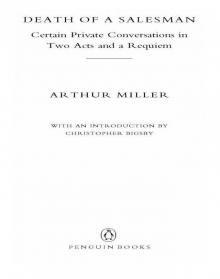 Death of a Salesman
Death of a Salesman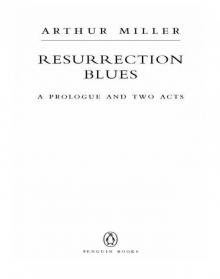 Resurrection Blues
Resurrection Blues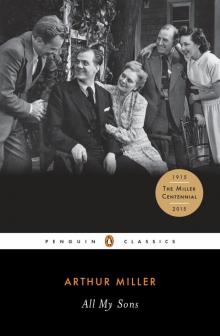 All My Sons
All My Sons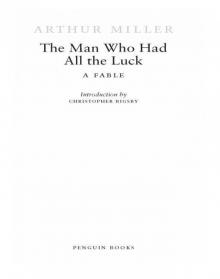 The Man Who Had All the Luck
The Man Who Had All the Luck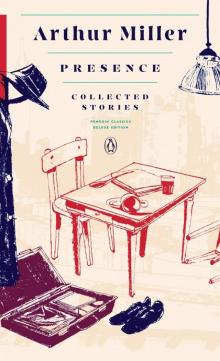 Presence: Stories
Presence: Stories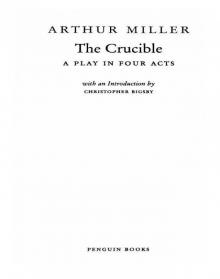 The Crucible
The Crucible Collected Essays
Collected Essays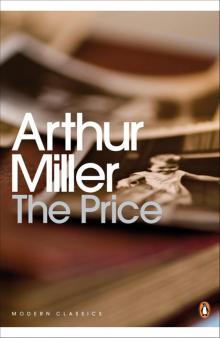 The Price
The Price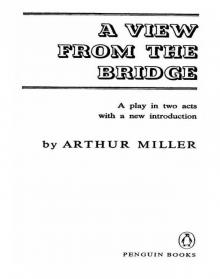 A View from the Bridge
A View from the Bridge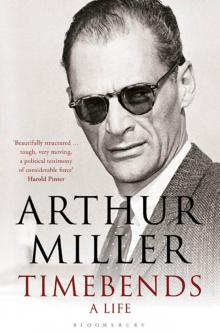 Timebends
Timebends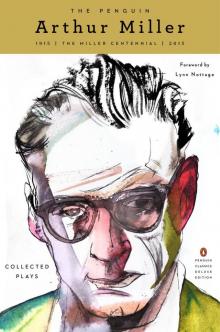 The Penguin Arthur Miller
The Penguin Arthur Miller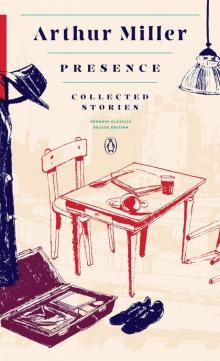 Presence
Presence